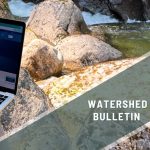From Indigenous Guidance to New Ways to see Water Data 🔍
Banner photo by Ward Toma, 2024 Lake Biodiversity Photo Challenge
Freshwater ecosystems cover less than 1% of Earth’s surface, yet support 10% of all species. Today, one-third of freshwater wildlife faces extinction due to habitat loss, pollution, invasive species, and climate change. With the recent conclusion of the UN Convention on Biological Diversity (COP16) in Colombia, biodiversity remains top of mind.
While the conference didn’t meet all expectations and ended without a consensus on key issues, we’re encouraged by the creation of a new subsidiary body for Indigenous and local communities, recognizing their invaluable role in biodiversity conservation. The impactful progress we’ve been able to make in freshwater conservation alongside Indigenous partners, citizen scientists, data users, and more, is highlighted in this update.


Bringing Watershed Data to Life with New Visualization Tool
Water data provides essential information for supporting local climate adaptation efforts and informed decision making on freshwater use. But what if there was a tool to help transform raw data into clear, compelling visual stories? In response to user feedback, the Columbia Basin Water Hub has launched an entry-level data visualization tool to better serve the data community.
With this interactive tool, users can more easily understand the data they collect, spot preliminary trends, and effectively communicate findings with wider audiences, especially those without a scientific background. Our latest Watershed Bulletin explores these new visualization capabilities using data from three water monitoring stations on different creeks within the Columbia Basin and discusses the important role of regional water hubs.


Captíkʷł guides Nicola Lake survey to improve foreshore health
Nicola Lake, a popular recreation destination and home to diverse freshwater wildlife, also holds a rich history for the Syilx and Nlaka’pamux people. Living Lakes Canada and the Upper Nicola Band (UNB) partnered to assess ecological, spiritual and cultural values and improve foreshore management in response to ongoing shoreline development and climate impact concerns.
Guided by the Local Indigenous Knowledge and Values Framework, co-developed by Living Lakes and UNB and grounded in the Sylix Okanagan Nation’s captíkʷł (oral stories) of the Four Food Chiefs, the 2023 re-survey documented changes over 12 years using GPS and drone assessments. The findings revealed that developments have degraded approximately 517 metres of shoreline since 2011. The Cultural Overview Assessment identified 19 Culturally Sensitive Areas, and the resulting guidelines provide evidence-based recommendations to protect both important cultural sites and vital foreshore habitats.


A Snapshot of the 2024 National Lake Blitz
Lakes have long been at the heart of communities, serving as hubs for transportation, recreation, subsistence, and connection to nature while supporting remarkable biodiversity. That’s why we’re celebrating the 277 dedicated volunteers who played a key role in caring for lakes across 10 provinces and 2 territories during the 4th annual National Lake Blitz!
From May to October, volunteers monitored 220 lakes and recorded 2,066 observations, tracking wildlife such as birds, mammals, insects, fish, and more. Dive into the 2024 wrap-up story, featuring highlights of remarkable wildlife observations, national and regional data maps, seasonal statistics, and inspiring volunteer stories.


Imagine a World Without Freshwater…
This Giving Season, we’re launching a special campaign to support the freshwater ecosystems that sustain us all. Your support will help safeguard lakes, rivers, and wetlands for wildlife and communities. Can’t wait? You can give early and join us in this mission to ensure thriving, healthy freshwaters for generations to come.


Nerdy about Nature: Making Watershed Science Accessible through Social Media with Ross Reid
Ross Reid, the creative force behind the social media sensation Nerdy About Nature, has nearly 300K followers on Instagram and 200K followers on TikTok. On November 20 at 5:30 PT / 6:30 MT / 8:30 ET, Ross will offer a glimpse into his captivating project, share clips of his favourite social media videos, and provide insights into promoting watershed restoration and accessibility in science education. Get ready for an engaging session that goes beyond the typical slideshow — prepare to learn, laugh, and leave inspired!


Living Lakes Canada selected for 1% for the Planet’s Featured Partner Guide
Imagine if just 1% of annual sales from businesses worldwide were reinvested back into the very ecosystems that sustain their profits. This is the vision of 1% for the Planet, an initiative that’s raised more than $672 million in donations to date.
Living Lakes is delighted to announce that, among over 5,000 members, our organization was selected for 1% for the Planet’s new Featured Partner Guides. A gold star now marks Living Lakes’ partner page as an official recommendation in the Freshwater Ecosystems guide. This recognition highlights our exceptional contributions to protecting freshwater ecosystems and the significant impact we’re making.

Our Current Reads
Pressure on Canada to Export Water Will Be Immense – The Tyee
Here’s how protecting freshwater ecosystems can help countries meet their biodiversity targets – United Nations Environment Programme
New Poll Finds Public Concern Surging After Recent Floods And Water Short – BC Watershed Security Coalition
Global water crisis leaves half of world food production at risk in next 25 years – The Guardian
‘A responsibility to protect’: Canada launches independent agency to manage freshwater – The Narwhal






